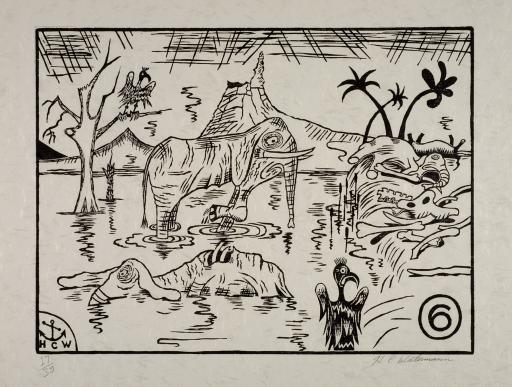The Connecticut Ballroom Suite: 6, H. C. Westermann
Artwork Overview
H. C. Westermann, artist
1922–1981
The Connecticut Ballroom Suite: 6,
1975–1976
Where object was made: United States
Material/technique: color woodcut
Dimensions:
Image Dimensions Height/Width (Height x Width): 455 x 609 mm
Sheet/Paper Dimensions (Height x Width): 610 x 765 mm
Image Dimensions Height/Width (Height x Width): 17 15/16 x 24 in
Sheet/Paper Dimensions (Height x Width): 24 x 30 1/8 in
Mat Dimensions (Height x Width): 30 x 36 in
Image Dimensions Height/Width (Height x Width): 455 x 609 mm
Sheet/Paper Dimensions (Height x Width): 610 x 765 mm
Image Dimensions Height/Width (Height x Width): 17 15/16 x 24 in
Sheet/Paper Dimensions (Height x Width): 24 x 30 1/8 in
Mat Dimensions (Height x Width): 30 x 36 in
Credit line: Museum purchase: Peter T. Bohan Fund, Friends of the Art Museum, Mr. and Mrs. Richard Nadeau, Richard Belger, Hollander Family Foundation, in memory of Richard Hollander
Accession number: 1993.0034.08
Not on display
If you wish to reproduce this image, please submit an image request



